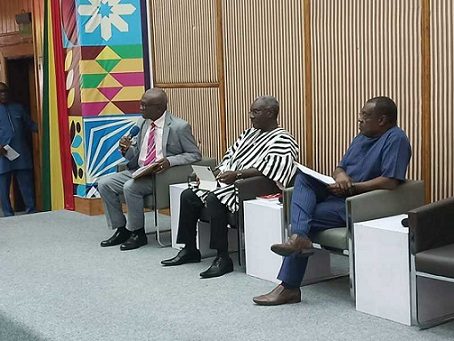The African Center for Economic Transformation (ACET) has taken another judicious move by partnering with the National Development Planning Commission (NDPC) to organize a Technical Consultation on National Development Planning.
The consultation was aimed at sparking a national dialogue in order to reach a consensus on formulating and implementing a long-term development framework and vision for Ghana’s economic and political transformation.
Speaking at a Technical Consultation on National Development Planning Agenda held at the International Conference Center in Accra, Founder and President of ACET Dr. Kingsley Y. Amoako, explained that following the launch of the Compact for Ghana’s Political and Economic Transformation (the Ghana Compact) there was there need to hold a Technical Consultation on National Development Planning.
According to him, the Technical Consultation will help them brainstorm the challenges Ghana has faced in National Planning in the last three decades and reach a consensus on how to address them.
Dr. Amoako said that the consultation was part of a broader effort to build consensus, which was at the heart of the Compact. “Consensus is necessary for long-term success.
Highlighting the importance of the Ghana Compact, he said it seeks a new, more hopeful, and inclusive way to tackle the fundamental challenges we face.
“And when finished, it will be an agreement between citizens and government leaders, regardless of the party in charge, on the direction of travel for our country, and on the vision and principles that underpin our democracy,” he explained.
The Director General of the National Population Council (NDPC) Dr. Kodjo Mensah-Abrampa, shedding light on the National Development Planning Paper, underscored the need for legitimizing national development plans as well as reviewing the Constitution to lift the approval process of all plans by the NDPC to Cabinet and Parliament.
The Commission was made an advisory body under the current constitutional arrangement because its plans were not binding on the President.
Dr. Mensah-Abrampa, on the other hand, spotlighted some key challenges in development planning, such as discontinuity in planning, inconsistencies in policies and policy formulation and coordination, and governments favoring short-term physical projects over long-term structural reforms.
Professor George Gyan-Baffour, Chairman of the NDPC noted that the Commission’s mandate was to advise the President and engage parliament.
However, he pointed out some of the development frameworks it had embarked on, including the Ghana Vision 2020 and the Medium Term National Development Policy framework.
Some speakers at the session were Mr. Suman Bery, Vice Chair of the Indian Planning Commission (NITI Aayog) who shared his experience on perspectives based on other countries’ experiences, and Mr. Julius Muia, Former Principal Secretary of the State Department Principal Secretary for Planning in Kenya.
Others were Dr. Ed Brown (ACET), Prof. Ernest Aryeetey, a former Vice-Chancellor of the University of Ghana, President of Ghana Institute of Planners (GIP) Alhassan Mohammed, and Dr. Eric Oduro Osae, Director General of the Internal Audit Agency of Ghana.
About Ghana Compact
The Compact for Ghana’s Political and Economic Transformation is a consensus-building initiative that seeks to set well-articulated and collectively agreed to goals and targets for Ghana’s governance, political processes, economic management, and policies of inclusion for the second quarter of the 21st century.
As Ghana approaches its next election cycle in 2024, the Compact offers an opportunity to move from politically focused to issues–driven campaigns and gives citizens more power to hold their current and future leaders accountable to the vision they have set forth.
The Ghana Compact was a collaborative effort between ACET and leading policy institutes such as the Center for Democratic Development- Ghana (CDD), Netright Ghana, IMANI Ghana, the Institute for Fiscal Studies (IFS), and civil society organizations such as Integrated Social Development Center, Ghana (ISODEC) and Youth Bridge Foundation.

Source: Isaac Kofi Dzokpo/newsghana.com.gh








![Stonebwoy holds star-studded party for ‘5th Dimension’ mega album [Video]](https://ghananewss.com/storage/2023/04/stonebwoy-partyy-100x75.jpeg)









